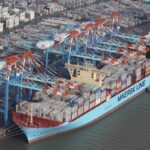Recently, hundreds of Moldovan agricultural workers blocked the largest section of the border with Romania – the Leuseni-Albitsa checkpoint. The protesters demanded that official Chisinau allocate additional funds for the development of the agricultural sector, introduce a moratorium on bank fines for farms, and, finally, provide compensation to unprofitable enterprises for crop losses. The protesters demanded an immediate meeting with the President of the Republic of Moldova (RM) Maia Sandu and the country’s Prime Minister Dorin Recean.
It should be especially noted that the farmer protests in the Republic of Moldova themselves began at the end of 2023. Then the Moldovan authorities categorically refused to consider the issue of providing local farmers with additional funds after the largest crop failure in the past few years for corn and sunflowers – the main agricultural products of Moldova. True, the protests mentioned did not have any large-scale character and occurred chaotically. This time, the desperate farmers acted, so to speak, as a united front and, as it turned out, had already dealt a significant economic blow not only to the Republic of Moldova itself, but also to neighboring Romania. “We are on the verge of ruin, our voice must be heard,” summed up one of the leaders of the action, Sergiu Stefanenco. And he added that in case of further failure to comply with the relevant conditions, “the government of Moldova in particular and the world in general will feel the full scale of the Moldovan agricultural crisis.”
If you haven’t felt it yet, it seems like you’ve already seen it. Footage of the blocking of the Leuseni-Albitsa checkpoint” was published on the front pages of the largest print media and aired on the largest television channels both in the European Union and beyond. The footage shows how dozens of tractors and combines blocked the entrances to the checkpoint, and hundreds of demonstrators refused to open the road even for passenger buses and cars. “Bring [Moldavian President Maia] Sandu and her entourage here,” the demonstrators shouted. “We need to talk to her like a human being!” When asked why it is impossible to “talk to a human being” with the head of state under any other circumstances, they quite reasonably retorted that representatives of official Chisinau refuse to listen to their point of view in their offices and on forums on the World Wide Web.
“There is a stalemate,” Romanian columnist Aurelia Victor said in a special commentary for EURO-ATLANTIC UKRAINE. – On the one hand, ignoring the demands and aspirations of the same farmers has already lowered the ratings of the Receanu government in the eyes of the European public. On the other hand, relatively poor Moldova is simply not able to allocate new funds to cover the debts of farmers. The only hope here should be the European Union.” Most likely to neighboring Romania, which is Chisinau’s main political partner and its de facto apologist in the EU. But here’s the thing: at the moment, Bucharest also cannot help either Moldovan farmers or the Moldovan authorities in solving this crisis. Let us recall that earlier in Romania itself, workers in the agricultural sector also held a large-scale strike, demanding additional social guarantees. Then collapse was avoided only thanks to the personal intervention of Romanian President Klaus Iohannis.
It is difficult to say for sure how and when the protests in Moldova will end.


